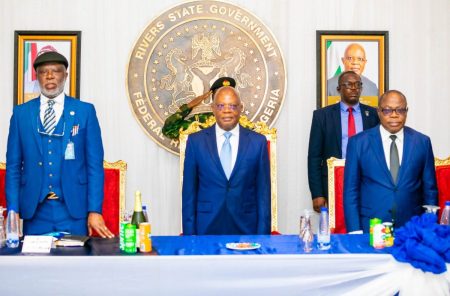 10 December 2013, Lagos – The recent announcement of the second licensing round for 31 marginal oil fields by the Petroleum Minister, Mrs. Diezani Alison-Madueke, came 12 years after the previous round in 2001.But, it is a welcome development and represents an opportunity to increase indigenous participation in petroleum upstream activities. It is also anticipated that the additional production from these stranded/satellite fields will boost the nation’s daily crude production output and government’s revenue.
10 December 2013, Lagos – The recent announcement of the second licensing round for 31 marginal oil fields by the Petroleum Minister, Mrs. Diezani Alison-Madueke, came 12 years after the previous round in 2001.But, it is a welcome development and represents an opportunity to increase indigenous participation in petroleum upstream activities. It is also anticipated that the additional production from these stranded/satellite fields will boost the nation’s daily crude production output and government’s revenue.
The term ‘marginality of a field’ is subjective, but whether it is untapped, abandoned or partially depleted reserves, the most important factor is always the degree of profitable production. Former Presidential aide, Dr Emmanuel Egbogah defines a marginal field as, “any oil discovery whose production would, for whatever reasons, fail to match the desired or established rates-of-return of the leaseholder.” The Nigerian Association of Petroleum Explorationists (NAPE) defines marginal fields as, “non-producing fields whose economics is not considered robust enough using conventional development methods under the prevailing fiscal regime.”
However, from an economic stand-point, a marginal field is one that can be developed with marginal profits regardless of the actual size of the oil field. It also requires special field development planning and reservoir management strategies in order to yield acceptable returns on investment (ROI).
2001 Licensing round
At the marginal field awards in the 2001 licensing rounds, 17 of these were awarded to sole operators and seven awarded to joint-venture operators, making a total of 24 licenses awarded to 31 companies.
Development challenges
The government in awarding these marginal fields to indigenous operators hoped to increase oil production by about 1 billion barrels. Some progress has been made in marginal fields’ development as eight out of the 24 operators have taken their fields to first oil.
However, more still needs to be done, and six factors have constrained the activities of marginal field operators. These relate to the lack of funding and the marginality of the fields; inadequate technical expertise; government policies on royalties and petroleum taxes; board/partnership wrangling in some cases; and in other cases the presence of significant anti-entrepreneurial mentality among the operators.
Funding constraints is the main reason cited by the growing number of Nigerian exploration and production (E & P) companies for the inability to progress on projects, as well as the necessity to invite foreign technical partners. The need to invite foreign partners has become inevitable given that most local banks have not co-operated with marginal field operators in putting these fields into production. However, such invitations run contrary to the core moral concept and principles of the marginal fields’ licensing exercise.
The original principle behind this exercise whereby the government took undeveloped discoveries, which has proven oil from the oil majors and awarded these to local companies, was to encourage indigenous capacity building in the upstream petroleum sector.
The indigenous marginal field operators were expected to employ Nigerian geologists and petroleum engineers, acquire workstations for their use. They were also expected to utilise other local skills in field development (in the office and on operational site), put local talent on site to supervise well drilling and produce the oil. This is meant to increase the pool of technically capable oilfield personnel, who can replicate the same exercise elsewhere in Nigeria and abroad. Therefore, to invite technical partners would mean that the country still has not ‘indigenised’ the development of these marginal oil assets.
The role of banks
Let us examine the role of local banks in funding marginal field projects and the reason why these projects have been under-funded by the banks. Skye Bank has funded a number of marginal field projects as follows: Platform Petroleum’s Gas Processing Plant, and WalterSmith’s Production Boost Project. Recently, Skye Bank approved a loan facility of $18m for Pillar Oil, to enable the company drill a well at an interest rate of 17% per annum. Former Intercontinental Bank approved $6m for Niger Delta Petroleum for the ‘work-over’ of Ogbelle 1, at an interest rate of 18% per annum, a project that led to their crucial first oil.
Brittania-U received their initial funding of $23m from Union Bank in 2007 for its project on the Ajapa field. By the time Brittania-U reached first oil, this loan had increased to $50m. Brittania-U also received an additional $30m loan facility from Union Bank, which the company used to buy-out its ‘troublesome’ foreign technical partners. Currently, the company is producing about 2,300 barrels per day (bpd).
However, focusing on the fortunes of Brittania-U might give the erroneous impression that the local banks are in a lending frenzy to marginal field operators. The fact is that of the six companies producing from marginal fields as at 2011, only Brittania-U commenced operations with a bank loan. Platform Petroleum, the first to reach production, was able to do so with funds provided by its partners (New Cross), a cash-loaded Nigerian company. Pillar Oil struggled for cash and was forced to rally funds through shareholder’s contributions, in order to commence production without a bank loan. Pillar is drilling a new well being funded by Skye Bank, to enable the company increase production. WalterSmith Oil Ltd could not raise funds from a bank until it had established production. Energia Oil Ltd funded its field development with cash flow from its shareholders.
From a banker’s perspective, the real problem with funding marginal field projects lay with the definition of marginal fields and how these should be funded. Most banks insist that the problem with funding marginal fields’ development is that the only asset available on the table as collateral is the marginal field itself. But banks insist that if a marginal field operator has cash flow from other oilfield operations, or other businesses or has a sizeable deposit with the bank, then the bank can leverage on these to approve loan facilities.
The case of Brittania-U is more of the exception than the rule, whereby local banks were willing to finance their project on projected reserves-based lending. The reason is that reserves-based lending which is the modus required for financing start-ups like marginal field operations is yet to be embraced by local banks in Nigeria. The traditional banking concept in this country, which emphasizes lending against collaterals and securities, still holds sway, and this is not applicable to marginal field development.
The concept of reserves-based lending accepts ‘oil in the ground’ as collaterals and more of the local banks in Nigeria should be willing to embrace this concept for their lending decisions in regard to marginal fields’ development
– Chijioke Nwaozuzu



